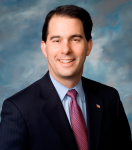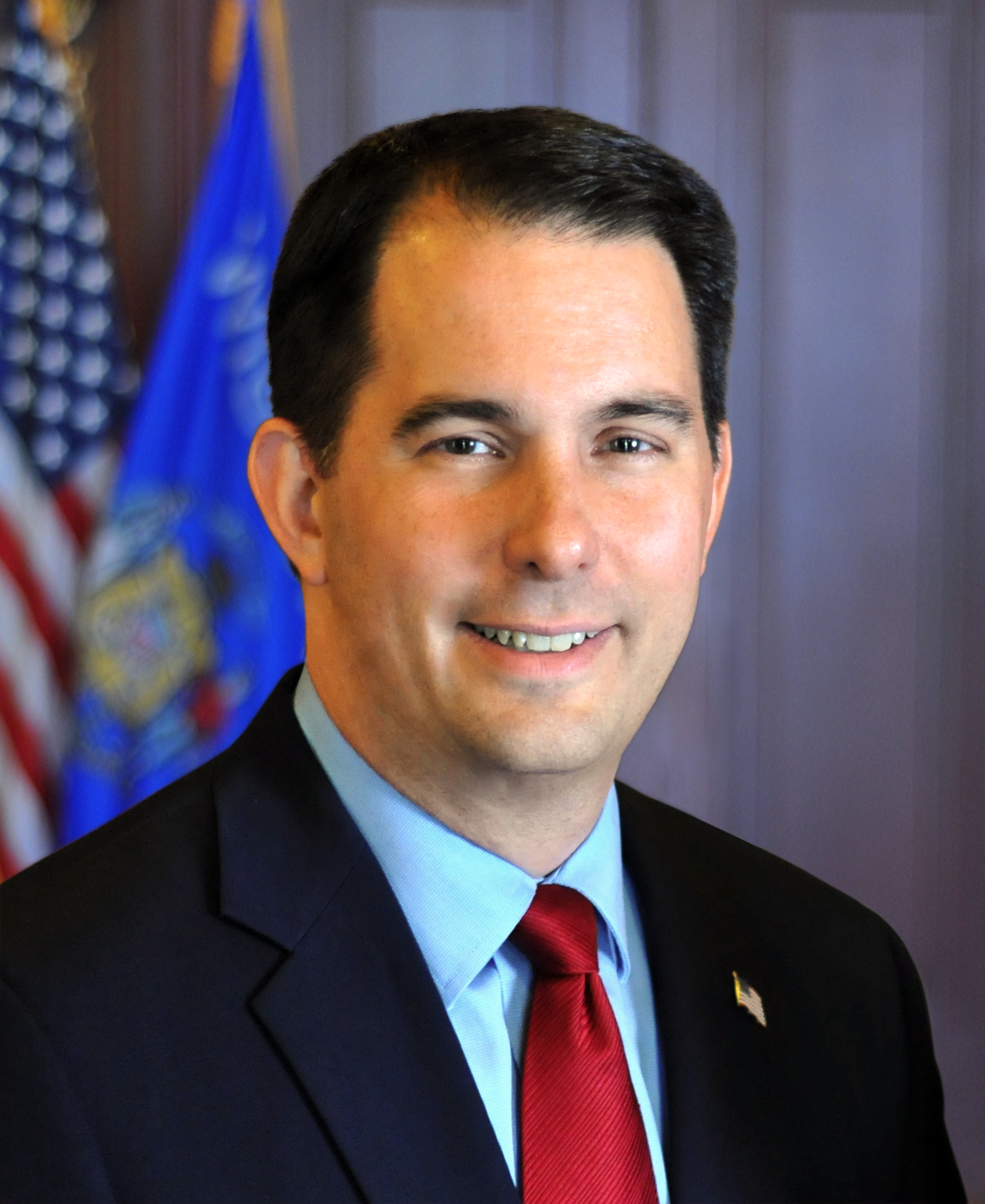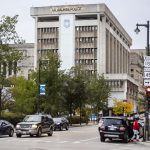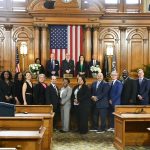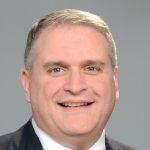Governor Walker Delivers 2017 State of the State Address
First Lady Tonette Walker joins Governor in addressing joint session, people of Wisconsin
Madison – Governor Scott Walker today delivered his 2017 State of the State Address at the Wisconsin State Capitol. First Lady Tonette Walker also delivered remarks regarding one of her initiatives, Fostering Futures, which focuses on trauma-informed care. Below is a copy of the Governor’s remarks, along with the First Lady’s, as prepared for delivery:
2017 STATE OF THE STATE ADDRESS
Governor Scott Walker
Tuesday, January 10, 2017, 3:00 P.M.
Wisconsin State Capitol
Speaker Vos, Speaker Pro Tem August, President Roth, Assistant Majority Leader Vukmir, Minority Leader Shilling, Minority Leader Barca, Supreme Court Justices, Constitutional Officers, tribal leaders, members of the Cabinet, members of the Legislature, distinguished guests, and most importantly, fellow citizens of Wisconsin, it is an honor to come before you this afternoon, to report on the state of our great state.
First, I would like to introduce the First Lady of Wisconsin, my wife, Tonette Walker. Thank you for all that you do for the people of the State of Wisconsin. Next to my wife – our sons, Matt and Alex.
Next to my family is the Adjutant General of the Wisconsin National Guard, Major General Donald Dunbar. On behalf of the citizens of this great state, I want to thank you and the more than 10,000 strong members of the Wisconsin National Guard.
At the start of December, I had an opportunity to travel overseas to visit Wisconsin troops in the National Guard, reserves, and active duty in Kuwait, the United Arab Emirates, Afghanistan, and Germany. Then, at the end of last month, General Dunbar and I went to Guantanamo Bay to visit members of the 32nd Military Police Company from the Wisconsin Army National Guard. I am so proud of the men and women from Wisconsin. Please remember all of our service members, and their families, in your prayers.
To all of our men and women in uniform, we appreciate all that you do – here and abroad. Thank you to you and to your families.
Today, I am happy to report that the state of our state is strong.
More people were employed in Wisconsin last year than at any point in the history of our great state. Unemployment levels are the lowest in more than 15 years. And the percentage of people working in Wisconsin is one of the highest of any state in the country.
We are working and winning for Wisconsin.
In the Kenosha area, Joshua, a former Marine Staff Sergeant, was hired as a maintenance technician at Colbert Packaging. The company just announced in October it was relocating from Illinois to Kenosha and plans to hire 100 employees this year. Over the past three years, 7,900 jobs have been created in this county that borders Illinois, in addition to $1 billion in capital investment and more than 9.5 million square feet of development.
In the Fox Valley, Amy was hired in the HR department at Amerequip in Kiel. She joins us here today, along with Amerequip’s CEO Mike VanderZanden. Thank you for joining us. Amy specializes in recruitment and works with our technical colleges on youth apprenticeships. Since 2011, Amerequip has invested more than $20 million into improvements for its facilities, and the company most recently doubled its welding capacity.
These stories show the real faces of record employment in the state. Which begs the question, “Are the people of Wisconsin – you, me, us – better off than we were six years ago?” The answer is a resounding yes. It may seem hard to believe now, but during the four years before we took office, Wisconsin had lost more than 133,000 jobs and the unemployment rate peaked at 9.2%. When we first took office, the biggest challenge in our state was helping to create more jobs.
Today, we’ve more than recovered the jobs that departed during the recession, wages are up, more than 50,000 new businesses have been created, and our unemployment rate is down to 4.1%. In fact, our biggest challenge is not creating jobs, but finding people to fill them. We went from a focus on “jobs, jobs, jobs” to talking about “workforce, workforce, workforce.” This is my top priority for 2017 – and beyond.
During the past four years, we invested millions into workforce development. This helps people like Gary, Ryan, and Jeff who are part of our Wisconsin Fast Forward program. Today, they work at Catalyst producing mechanical printing paper. These are just a few of the many people who were trained through the Wisconsin Fast Forward grant program and they are here with us today.
Gavyn, Matthew, Caitlin, and Brianna are just a few of the students who got a head start on their career through youth apprenticeships offered while they are in high school. This program has more than doubled since we took office. Thanks to all of you for being here this afternoon.
And Madelyne and Jordan graduated from our Project SEARCH program here in Wisconsin. Each of them is working, and they are part of a program for people with disabilities that has a success rate of 88%. I am proud that the number of Project SEARCH sites has grown from two when I first took office to 18 today. By this next school year, we will have 27 sites across the state. Madelyne and Jordan, thanks for joining us here today.
We are working and winning for Wisconsin.
In addition to a growing economy, I am happy to note that our finances are stable. We finished the fiscal year, yet again, with a surplus. Our rainy day fund is 165 times bigger now than it was when we first took office. And Wisconsin has the fourth lowest overall long-term debt obligation of any state in the country.
Getting our finances under control allows us to reduce the burden on the hard-working taxpayers. I am proud to report that, since taking office, we’ve cut taxes by more than $4.7 billion. That means a cumulative income tax reduction of $1,159 for a typical family. We also cut property taxes. Since December of 2010, the cumulative reduction is $426 for a median-valued home. In the decade before we took office, property taxes went up 27 percent. If that trend had continued, the difference is a savings of $1,700. That’s real money.
Property taxes, as a percentage of our personal income in this state, are the lowest they’ve been since the end of World War II. Plus, here’s another piece of good news – from 2010 to 2014, Wisconsin outperformed 43 other states in reducing the overall tax burden. Remember – since taking office, we’ve cut taxes by more than $4.7 billion. And we’re not done yet. Just as I promised when running for re-election, property and income taxes will be lower in 2018 than they were in 2010.
That’s great news for families like Jeff’s and Patricia’s, who told me how surprised they were to see their property tax bills going down!
We are working and winning for Wisconsin.
In addition to providing more tax relief, getting our finances in order allows us to focus on other priorities.
For example, we invested more than $18 billion into transportation over the past six years. Put that into perspective: that’s about $2 billion more than my predecessor put into transportation during the previous six years.
We have also invested more than $14 billion into programs to help needy children, families, and seniors over the past six years.
Our reforms allowed us to cover everyone living in poverty under Medicaid. No other Wisconsin Governor has been able to make that claim. In fact, we rank as one of the best states in the nation for health insurance coverage. And even though we did not take the Obamacare Medicaid expansion, we actually outrank 21 of the states who did – and every one of the 22 other states that did not.
A few years ago, some argued that we should take the Obamacare Medicaid expansion money. In turn, I warned that it would come back to hurt Wisconsin taxpayers.
What happened in Minnesota this past year suggests we were right. Late last year, health insurance premiums there increased by as much as 67 percent. The governor of Minnesota declared, “The Affordable Care Act is no longer affordable.” And just last week he called on the Legislature to spend $313 million to buy down health insurance premiums, putting Minnesota taxpayers on the hook.
We are working and winning for Wisconsin.
Our improving financial situation also allows us to do more to help our students prepare for college and careers. You see, it is a moral imperative that every child has access to a great education. But it is also an economic imperative as we need to grow the workforce in Wisconsin.
We invested more resources this past year into college and career readiness initiatives, including dual enrollment, FAB labs, and youth apprenticeships. The state started providing funding for school districts to do academic and career plans as early as 6th grade starting this year. We want every child to prepare a path to a career that is right for them.
Across the state, our students are doing well. We just started including everyone in the ACT tests and Wisconsin is one of the best states in the country in that category. Students here also have some of the best graduation rates in the country.
On top of that, more than 90% of the school districts in the state meet or exceed expectations according to the report cards. One of those districts is Neenah. Today, we are joined by students and teachers from Neenah.
And families – particularly low-income families – all over the state now have more quality choices in education. For many, (like it was in my family) it will be a traditional public school. For others, it will be a charter or a choice school. Some will choose a virtual school, while others prefer to homeschool their children.
Many of the areas of new investment in our schools are giving students a jumpstart on their careers. Our initiatives are helping many students get through college sooner and into the workforce. Earning college credits in high school also helps reduce the cost of higher education.
In addition to reducing the time needed to receive a degree, we need to focus on the price of going to college in the first place. For the past four years, we froze undergraduate, in-state tuition for students at all University of Wisconsin campuses. A typical student saves more than $6,300 over four years when compared to the trend before the freeze. Tonette and I still have a son at the University of Wisconsin and we appreciate the freeze just as other families do all across the state.
During the decade before our freeze, tuition went up 118%. Ironically, some of the people who were around when UW tuition went up more than 8% on average each year now want the state to create a new government bureaucracy to refinance student loans.
We found a better way to help people with high debt. Our administration has worked with Wisconsin’s very own financial institutions to promote refinancing options available to those with student loan debt. Wisconsin credit unions and banks offer refinancing at rates that are the same or better than what is offered by many government-supported programs in other states. I encourage anyone dealing with student loan debt to visit LookForwardWI.gov to find out what refinancing options are available in your area. We also provided the greatest amount of need-based financial aid in Wisconsin history.
We are making college more affordable, and at the same time, the University of Wisconsin is thriving. The UW System had the largest overall budget in history this year. U.S. News and World Report moved the ranking of UW-Madison up on their list of the best public colleges in the country. They also gave positive mentions to 10 other UW schools.
In addition, we invested more into the Wisconsin Technical College System. Our Blueprint for Prosperity plan opened 5,000 more slots for students in high-demand areas, and this past spring, we expanded the Wisconsin grant program. Our technical colleges continue to be a super option for so many students looking for a rewarding career.
We are working and winning for Wisconsin.
Last year, I spoke about plans to travel the state as part of a long-term planning process called 2020 Vision. Throughout the past year, I held listening sessions in every county to hear about where we would like the state to be in 20 years.
From students to retirees, I heard from a diverse mix of people. Teachers, small business owners, farmers, factory workers, law enforcement, veterans, technical college staff, local officials, community activists, health care professionals, non-profit leaders, clergy, parents, union leaders, loggers, tourism directors…we had a cross section of different ages, backgrounds, professions and political beliefs.
On top of that, we are connecting in other ways too. For example, we will host another Facebook Live session next Tuesday, January 17 at 4:00 pm. Join us at Facebook.com/
Several major issues came out of our listening sessions across the state. Student success, accountable government, and rewarding work were consistent themes. These are the areas we will talk about today and they will be the focus of our state budget.
As promised, we will increase funding for public education. I love public schools.
Both of my sons graduated from public schools in the City of Wauwatosa. I graduated from a public school in the small town of Delavan. And my nieces are attending public schools today. I want strong public schools. In fact, I want great schools for every student in this state.
Our budget will include a significant increase for public schools. We will also help rural schools that have unique challenges such as transportation costs, broadband access, and declining enrollment.
College affordability was also a major issue at our listening sessions. But it wasn’t just students who are concerned about the cost of higher education – it is parents, grandparents, educators, and many others. That’s why I am pleased to announce that our 2017-2019 state budget will do more than just freeze tuition. We will actually cut tuition for all Wisconsin undergraduates throughout the UW system.
We are working and winning for Wisconsin.
In addition to student success, we heard people say they want government that is accountable to the taxpayers.
Overall, many at our listening sessions took pride in the fact that we are self-reliant here in Wisconsin. With this in mind, we will continue our efforts to streamline government to make it more effective, more efficient and more accountable to the people.
Access to high speed and reliable internet service is something we heard about at nearly every listening session.
Therefore, I am proposing the state invest $35.5 million more to expand our broadband access grant program and for our efforts to help upgrade technology, and train teachers from small and rural school districts. That would bring our total investment to $52 million. The great thing about the Broadband Expansion Grant program is that once the high-speed network is in, the rest is up to the local telecommunication provider – there is no need for a permanent government program.
My mother was born and raised on a farm. For her parents’ generation, electricity changed the way we farm in America. Access to broadband is like that today in rural parts of our state.
This afternoon, I call on the members of the state legislature to pass our plan as soon as possible to help connect everyone in the state.
Good internet and cellular connections are important for a strong economy and quality of life. So is a solid transportation system.
As I stated earlier, we invested more than $18 billion into our state transportation system over the past six years. That’s about $2 billion more than the previous administration did during the same time period. In fact, the previous administration and legislature actually raided $1.4 billion from the state transportation fund. We reversed that trend and restored a commitment to a strong transportation system in the state.
Safety and maintenance of our existing system is a priority. Last year alone, there were more than 300 construction projects going on in the state. You probably drove through one of them.
Looking ahead, we will provide local governments with the largest increase in transportation aids since the 1990s. This includes an investment of 25% more over last budget alone in the Local Road Improvement Program, $65 million in new local aids, and the largest increase to the Local Bridge Improvement Program in over 20 years. Local governments can use these funds to fix roads and bridges and potholes in their communities.
We will also provide more money for state highway rehabilitation than ever before to meet our commitment to safety and maintenance of the existing system. Altogether this budget represents a 39% increase in maintenance and safety over my predecessor’s last transportation budget. We can do all of this – and more – without a gas tax or vehicle registration fee increase. I will keep the promise I made to the voters in the last election. Whether you agree with me or not, I hope you can respect that I will keep my word. We were not sent here by the people of Wisconsin to raise taxes.
Those at the listening sessions told us that they want us to keep the tax burden down while finding ways to improve education, train our workers, and make investments in our infrastructure.
We are working and winning for Wisconsin.
Another way to provide more accountable government is to change the way we operate. I asked my wife, Tonette, to join me at the podium to tell you about an issue that’s close to her heart.
Good afternoon. As Scott mentioned, I want to share with you a new way of delivering services to children and their families. Several years ago, I put together a group of leaders and experts to explore innovative ways to work with Wisconsin’s families.
We call our initiative Fostering Futures.
Fostering Futures is about creating hope by advancing principles of trauma-informed care across Wisconsin. Let me give you an example: if a child is belligerent and angry as he meets with his child welfare worker, we used to say “what’s wrong with that child?” But with trauma informed care, we teach people to ask the question “what happened to that young person?”
Instead of labeling the child as “good” or “bad,” this approach moves us to better understand what could be causing the behavior.
Just so we’re clear, we know that there still has to be consequences for their actions. But shifting to a trauma-informed perspective gives us access to more tools for success and better outcomes.
Sadly, too many children (and adults too) struggle because they experienced some form of trauma or early adversity. Maybe it was drug abuse in the home. Maybe they saw domestic violence. Or maybe they were a victim of child abuse. Trauma-informed care offers strategies for understanding what is at the root of their struggle and can help identify more effective solutions.
I am proud that Scott is supporting Fostering Futures as we train county workers and state government staff to use trauma-informed care. We know that this approach will not only support government employees in their work, but also improve the lives of Wisconsin’s children and families. Thank you.
Thank you, Tonette, for your commitment to changing the way we help children and families in our state.
In addition to student success and accountable government, people told us over and over again that we need to be rewarding work. Today, I am proud to report that more than 21,000 people have gone through our Food Share Employment Training program and are working in Wisconsin.
They are people like Sandy in northern Wisconsin. She was struggling as a single mother of four when she signed up for the program. Within weeks, Sandy had multiple job offers and is now employed full-time. Sandy’s story is a model of success, and now she gives back, as a speaker and mentor in the Eagle River community.
And people like Leon, who now works in Wisconsin Rapids. Our program staff helped him get the skills he needed to be employed and now he has a dream of starting his own cleaning business.
These are just a few of the great stories of people who turned their lives around through our program. It is good for the taxpayers. It is good for employers. Most of all, it is good for people like Leon and Sandy as we give them a chance to positively control their lives.
Without a doubt, Wisconsin is working.
The number of people on the state’s W-2 welfare program dropped 27% to near historic lows. Continuing unemployment insurance claims are at a 40 year low. And our unemployment rate is the lowest it has been since February of 2001. Think about that… My sons Alex and Matt are 21 and 22 years old. The last time the unemployment rate was this low, they were five and six years old.
All this points to an obvious fact: we need more people in the workforce. This week alone there are nearly 80,000 job openings listed on JobCenterOfWisconsin.com. Earlier I listed many of things we are doing to improve education and training in this state to prepare and grow our workforce. Still, we need to do more to get people into jobs.
Specifically, I am proud of the work we are doing to help veterans get into the workforce. A year ago, unemployment rates for vets were among the lowest – meaning the best – in the country. Having visited so many of our service men and women out on deployment, I want to ensure that every one of them has a job when they return home.
We can also do more to help people with disabilities. The Department of Workforce Development has helped a record 9,507 individuals with disabilities reach their employment goals.
Still, we need to do more to get people into the workforce.
That means transitioning people from government dependence to true independence through the dignity that comes from hard work. Here in Wisconsin, we are willing to help people who are down and out. But public assistance should be a trampoline, not a hammock.
I am happy to report that we now require adults on public assistance, who are able to work, and do not have children at home, to be employed or enrolled in our job training programs, looking for work at least five times a week, and be able to pass a drug test. If someone fails the test, we help them with rehabilitation, so they can get healthy and ready to enter the workforce.
Over and over again employers are telling us of their dramatic needs for people who are ready to work and able to pass a drug test. We can find a job for everyone.
In 2017, we are going to push the federal government to allow Wisconsin to go even further – to be a leader once again on welfare reform. In the past, Governor Tommy Thompson led the charge across the nation. We can do it again. Rewarding work will be our top priority.
We are working and winning for Wisconsin.
As mentioned, more people are working than ever before in our state. Our schools continue to be some of the best in the country. The University of Wisconsin just moved up in another ranking. Chief Executive Magazine raised Wisconsin up again on the best places to do business – we’re up 30 states from 2010. Our improvement in the tax climate is one of the best in the nation. The economic impact of tourism went up 30% since we took office. Health care systems in our state are ranked in the top three in the country. And our farmers continue to grow and produce some of the best food on the planet – heck we just won the gold medal for the best cheese in the world.
Let’s face it. There is plenty to celebrate in Wisconsin – and don’t even get me started on the Green Bay Packers.
The state of our state is strong. Wisconsin’s future is bright. But we’re not done yet. There is more work for us to do, and I’m optimistic the federal government will finally heed the call to provide even more opportunities for us to lead the way on student success, accountable government, and rewarding work.
Together, we can move Wisconsin forward.
Thank you. May God bless you. May God bless our service members and their families. May God bless Wisconsin. And may God continue to bless the United States of America.
NOTE: This press release was submitted to Urban Milwaukee and was not written by an Urban Milwaukee writer. It has not been verified for its accuracy or completeness.
Mentioned in This Press Release
Recent Press Releases by Gov. Scott Walker
Governor Walker Orders Flags to Half-Staff Honoring Master Sergeant Jonathan Dunbar
Apr 13th, 2019 by Gov. Scott WalkerGovernor Scott Walker ordered flags to half-staff on Saturday, April 14, 2018.
Governor Walker Orders Flags to Half-Staff as a Mark of Respect for Captain Christopher Truman of the Lake Mills Fire Department
Jan 3rd, 2019 by Gov. Scott WalkerCaptain Truman died on December 31, 2018, while selflessly assisting a driver of a crashed vehicle on Highway 12 near the Yahara River Bridge in Monona, Wisconsin.
Governor Walker Appoints St. Croix County Judge and Ashland County District Attorney
Jan 2nd, 2019 by Gov. Scott WalkerGovernor Scott Walker today appointed Attorney Scott J. Nordstrand to serve as a judge on the St. Croix County Circuit Court and Attorney David Meany to the position of Ashland County District Attorney.

